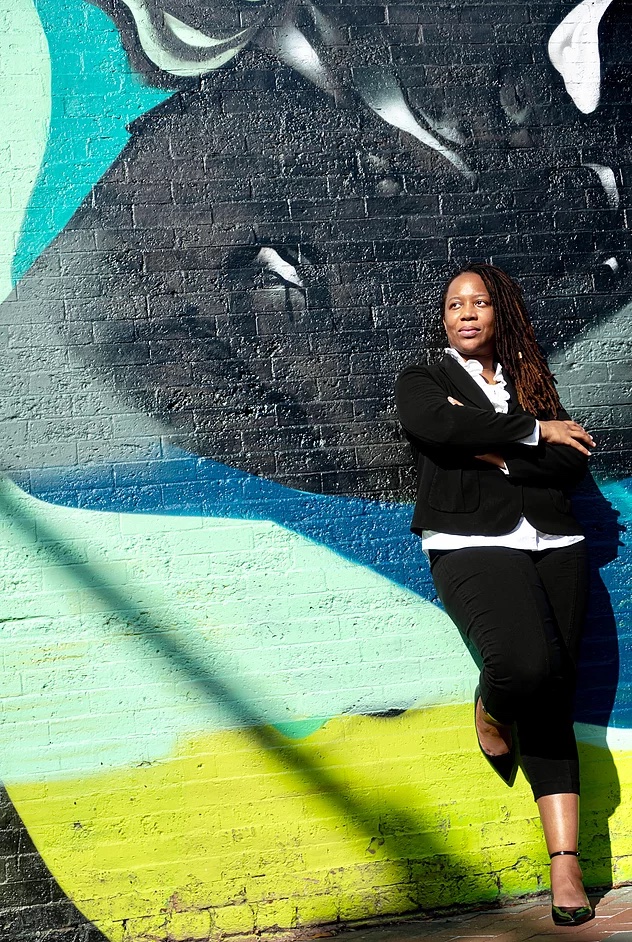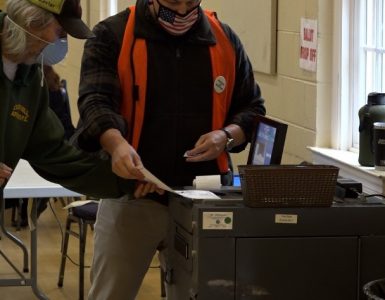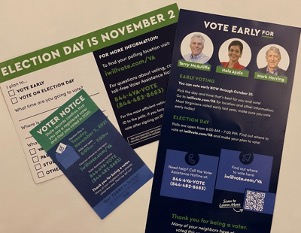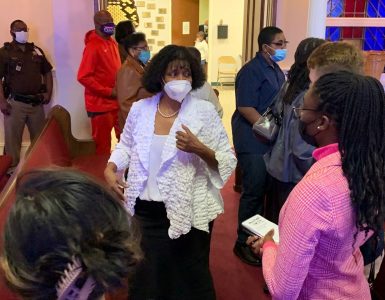Update: With 95% of the vote counted, a run at the Virginia Governor’s seat by Liberation Party candidate Princess Blanding has netted the third-party candidate around 23,000 votes or less than 1 percent.
By Nick Shereikis
RICHMOND, Va. – If you’ve listened to the radio, read a news story or watched television lately, you might have heard or seen the names Republican Glenn Youngkin and Democrat Terry McAuliffe. As Virginia careens toward what promises to be a nail-bitingly close gubernatorial election, both leading candidates are ramping up their outreach, and their advertising is reaching staggering proportions—but there’s also one name you might not have heard yet.
“I just heard about her this past Wednesday, or something like that,” Petersburg School Board Ward 4 Representative Celeste Wynn said when asked about third-party candidate Liberation Party candidate Princess Blanding. “I had no idea there were even three candidates until that Wednesday or Tuesday.”
As Virginia’s Liberation Party candidate, Blanding has struggled to attract voters’ attention. Still, her presence alone could play an outsized role in a startlingly close gubernatorial election. With a recent Post-Schar poll showing McAuliffe just one point ahead of Youngkin—earning 49 and 48 percent, respectively, though both numbers fall solidly in the poll’s margin of error—Blanding’s consistent 1 to 3 percent showing could be just enough to tip the scales. And if it does, it will most likely break the race in favor of Youngkin, considering the distinct overlap between the remaining candidates’ progressive platforms and voter bases.
“The Democratic Party is a big tent,” Democratic Party of Virginia Executive Director Andrew Whitley told journalists on Saturday, speaking to potential division in the party. “We have a lot of voters who feel very passionately about a lot of different issues.”
Blanding, an educator, added the activist title to her work after her brother, a 24-year-old high school biology teacher named Marcus-David Peters, was fatally shot by a Richmond police officer. Peters was having a mental health crisis and ran unarmed into rush-hour traffic. He ran toward a police officer, threatening to kill him before the officer shot him. (Prosecutors later found the shooting justified.)
And even if voters are falling in line for McAuliffe now, it doesn’t necessarily mean they’re happy about it.
“I mean, Terry’s not the most inspiring, you know, person. Personally, I voted for Jen McClellan in the primary,” 56-year-old Virginian author and educator Cheryl Ware said at a McAuliffe event in Henrico County this past weekend, before quickly adding, “And I unenthusiastically voted for Terry.”
In 2013, McAuliffe beat Republican Ken Cuccinelli by just 2.6 percent of the vote. Libertarian Robert Sarvis won 6.5 percent, almost three times that margin, presumably drawing votes away from Cuccinelli’s more mainstream conservative campaign. Now, despite the lower third-party polling numbers, that spoiler effect is again a real concern—except this time, it could hurt McAuliffe.
“Beware the third party,” Virginian political communications strategist Tucker Martin told reporters on Saturday. “Any votes that are coming for the third party are coming in, for instance, for Blanding. So the question is, if she gets a point or two…that could be the difference. That could be the ball game.”
Still, many of the state’s top Democrats say they don’t believe Blanding’s candidacy will hurt them.
Thank you, Virginia, for your support and enthusiasm. Stay tuned for the next chapter as the Liberation Party is here to stay! pic.twitter.com/QrtDeLQe97
— Princess Blanding (@PrinBlandingVA) November 3, 2021
“Independents in this state are just disaffected Republicans,” Richmond Mayor Levar Stoney said in a recent interview, suggesting a belief that third-party voters are of less concern to establishment Democrats than one might think.
And former McAuliffe campaign strategist George Chieffo agrees: “I haven’t given it much thought,” he said at a recent McAuliffe event in Richmond.
It’s an attitude that conforms to a now-familiar vein of political thought—that more progressive voters, while maybe displeased with Democratic candidates’ moderate positions, will still vote blue to prevent their state from flipping red (an even worse outcome, in their eyes, than centrism). Whether or not this will prove true in Virginia remains to be seen.
“I have not looked into her,” Wynn said. “My heart says [McAuliffe] led us in the right direction before. It’s like reapplying for a new job you already had, right? You have the references.”















Add comment